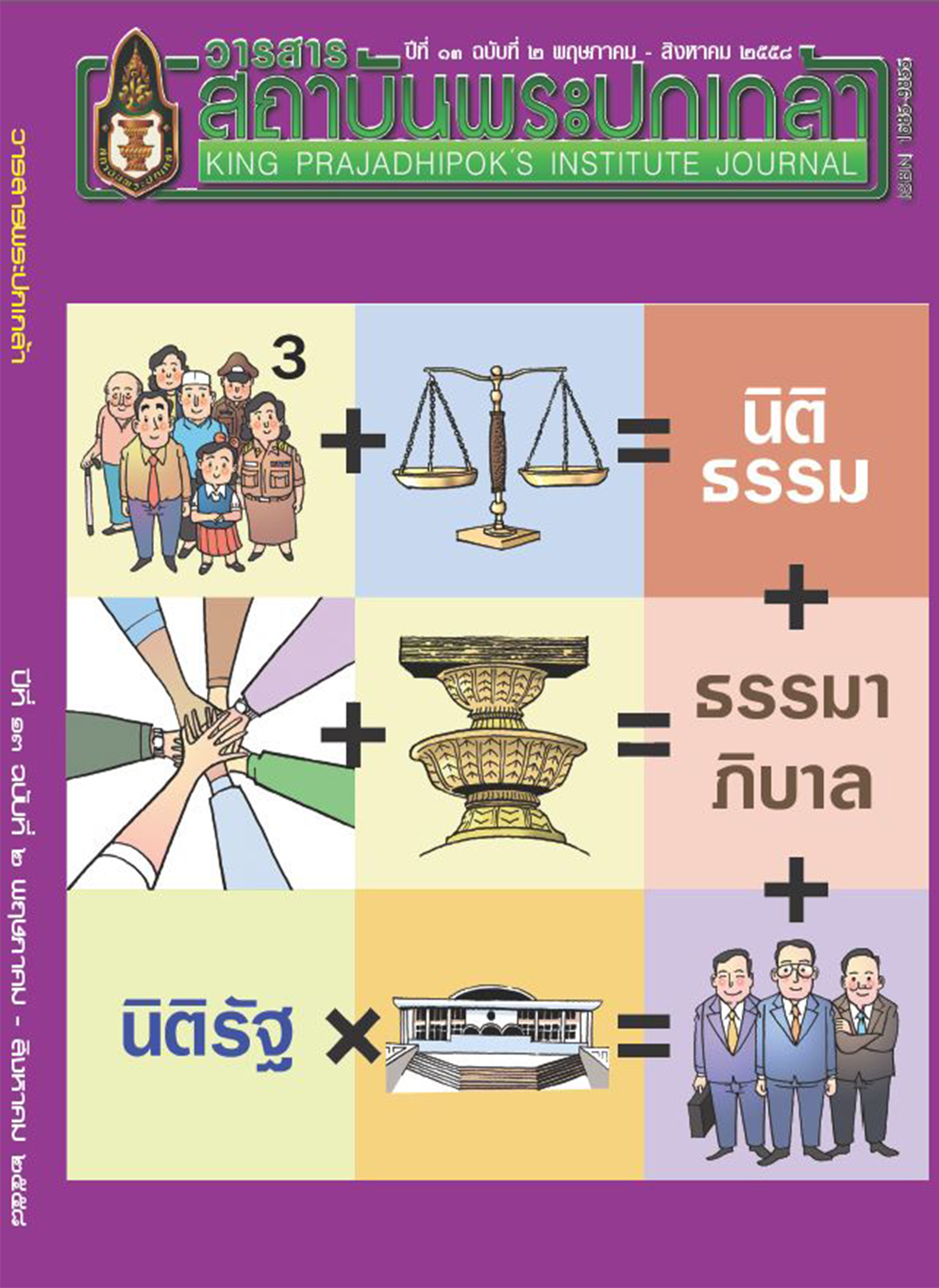The Scenario of Citizenship Education Curriculum at the Basic Education Level in the Next Decade (During 2012 – 2022)
Main Article Content
Abstract
The aim of the research was to study the scenario of citizenship education curriculum at the basic education level in the next decade. The research drew on the opinions of 24 experts by EDFR research and on the ideas of 363 citizenship education personnel from all over Thailand.
The study findings were as follow. Regarding the scenario of citizenship education curriculum, the curriculum’s philosophy was focused on education of quality. The good character of students were efficiency person to respect voice, freedom,communication, information and media literacy and public mind. The aim of the curriculum was to incorporate citizenship into democracy culture. The curriculum’s structure model was 1) civic education into collaboration; 2) teamwork leadership and public mind. The learning areas for grades 1-12 were responsible citizenship at national level, and understanding local political and social change. The learning activities were provided in the form of project-based learning. The learners developing activities was public mind, in community. The teaching materials included news, case studies, and other learning sources. The evaluation was focused on assessment for collaboration and participation.
Article Details
@ 2020 King Prajadhipok's Institute The Government Complex Commemorating All Right Reserved.
References
เกรียงศักดิ์ เจริญวงศ์ศักดิ์. ๒๕๔๖. ภาพอนาคตและคุณลักษณะของคนไทยที่พึงประสงค์. สำนักงานคณะกรรมการการศึกษาแห่งชาติ. กรุงเทพฯ:ห้างหุ้นส่วนจัด วีทีซี คอมมิวนิเคชั่น.
คณะกรรมการการศึกษาขั้นพื้นฐาน. ๒๕๕๓. เอกสารรายงานการประชุม การพัฒนาหลักสูตรเพื่อสร้างพลเมืองโลกในอนาคต. กรุงเทพฯ: กระทรวงศึกษาธิการ.
คณะกรรมการนโยบายปฏิรูปการศึกษา. ๒๕๕๓. ยุทธศาสตร์พัฒนาการศึกษาเพื่อสร้างพลเมืองไทย. สืบค้นเมื่อ ๑๕ พฤศจิกายน ๒๕๕๓, จาก http://www.manager.co.th
คณะกรรมาธิการการศึกษา. ๒๕๕๐. แนวทางการปฏิรูปการศึกษาในทศวรรษที่สอง. ม.ป.ท. ถ่ายเอกสาร.
คณะกรรมการการพัฒนาเศรษฐกิจและสังคมแห่งชาติ, สำนักงาน. ๒๕๕๔. แผนพัฒนาเศรษฐกิจและสังคมแห่งชาติ (พ.ศ. ๒๕๕๐ – ๒๕๕๔). กรุงเทพฯ: โรงพิมพ์องค์การสงเคราะห์.
คณะกรรมการการวิจัยการศึกษาแห่งชาติ. ๒๕๔๗. ทำดีเพื่อพ่อชีวิตพอเพียง. วารสารสำนักงานคณะกรรมการการวิจัยแห่งชาติ. กรุงเทพฯ: จุฬาลงกรณ์มหาวิทยาลัย.
จุมพล พูลภัทรชีวิน. ๒๕๕๑. การวิจัยอนาคต. วารสารสมาคมการวิจัย. ๑๓(๒), ๙ – ๑๓.
ชินภัทร ภูมิรัตน์. ๒๕๕๓. รายงานการประชุม เรื่อง การพัฒนาหลักสูตรเพื่อการสร้างพลโลกในอนาคต. กรุงเทพฯ: สำนักงานคณะกรรมการการศึกษาขั้นพื้นฐาน กระทรวงศึกษาธิการ.
ศึกษาธิการ, กระทรวง. ๒๕๕๑. หลักสูตรแกนกลางการศึกษาขั้นพื้นฐาน พุทธศักราช ๒๕๕๑. กรุงเทพฯ: โรงพิมพ์ชุมนุมสหกรณ์การเกษตรแห่งประเทศไทย จำกัด.
สำนักส่งเสริมการเมืองภาคพลเมือง. ๒๕๕๓. โครงการพลเมืองวัยใสใส่ใจบ้านเมือง. กรุงเทพฯ: สถาบันพระปกเกล้า.
สมหวัง พิริยานุวัฒน์ (๒๕๔๘, มีนาคม ๒๘). พลเมืองศึกษาของไทย. วารสารจุฬาสัมพันธ์. ๔๘ (๑๘).
Angell, V. Ann. 1991. Democratic Climates in Elementary Classrooms. A review of theory and research, Theory and research in social education. 22 (Summer 1991): 241 – 266.
Wallace, Joan Tessmer. 2002. The impact of technology on the curriculum form 1986 to 2000 : A Delphi study of recognized authorities in the field of curriculum and instruction. Retrieved December 07, 2002, from http://thailis.uni…net.th/DAO2detail.nsp


